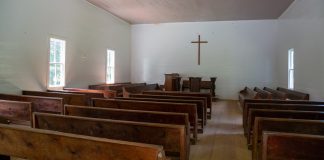The theology of the cross and the “theology” of the coming of age
When we try to understand our fellow human beings, to grasp their thinking, the reasons behind their decisions, and the purpose of their actions, a familiar adage from popular wisdom comes to mind: “Put yourself in their shoes.”
Baptism by fire
Probably no group in Christian history has been so unfairly judged as the Anabaptists.
Say it with a poem
Have you ever felt like there was nothing to your story? Like your life wasn’t anything worth sharing? Or like it would set you further apart from others?
On the banks of a river where no one had ever been
Jim Elliot was 25 years old when he headed to Ecuador as a result of the answer he sought from God regarding his future.
Things we forget about Martin Luther King Jr
Measuring more than nine metres tall, the pale granite carving of Dr King that is the centrepiece of the Martin Luther King Jr Memorial, just to the east of the National Mall in downtown Washington DC, makes it easy to forget that he was a relatively short man. His iconic likeness towers over visitors as his words carved into the stone walls around...
Jumping High: The one who inspired me at the Olympics
What does it take to be the best? Most people will tell you it’s a combination of hard work and talent. Ask Australian high jumper Nicola McDermott, however, and you’ll quickly realise it’s a mental thing. It’s absolute belief that you can achieve whatever you set your mind to.
Life under the cross and death at the stake
For the chained man, there were now only two options: unreserved submission to the council or condemnation; recantation or death. Outside, the stake was already prepared.
The emancipation of a free man
Louis Zamperini experienced the bizarre smell of death so many times that he came to the verge of losing his mind. However, he survived, and by choosing to forgive the unforgivable, he was able to breathe life into an entire world.
King, emperor, reformer
The Carolingian Renaissance must be understood as a "reform and reconfiguration of all peoples under the reign of Charles, with a view to creating a Christian territory in its institutional structures, moral conduct, and personal convictions."
A king’s dream: Martin Luther King, Jr. and the gospel of liberation
At the age of 34, he moved the American people with a speech about his biggest dream. At 35, he was awarded the Nobel Peace Prize. At the age of 39, his life ended suddenly, with Martin leaving his dream as a legacy to the next generations.
William Wilberforce | The “Nightingale” who devoured the Hydra
A deeply religious English politician and tireless social reformer, William Wilberforce, nicknamed the “Nightingale of the House of Commons” for his distinct and melodious speaking, made history with his contribution to the complete abolition of slavery in the British Empire.
Christ’s soldiers on the world’s front lines
“Prayer at the centre of our mission and mission at the centre of our prayer.”– Salvation Army catch-phrase
The Waldenses | The poor of Christ
The “poor of Christ”, the “poor of Lyon” or, simply, the “brothers” never called themselves “Waldenses” until they joined the Reformation. The derisive appellative was given to them by their persecutors, after the name of the man who consolidated the doctrine of the community.
The little giant
“Born in a home where the scant necessities of life were luxuries, when he left the world for heavenly scenes of labour, he bequeathed it his possessions–two silver spoons, a silver teapot, a well-worn frock coat the Methodist Church”[1] Basil Miller
Hudson Taylor | When the mountains move aside
Hudson Taylor undertook eleven journeys between Europe and China, and his mission prospered. He had one of the most complex and successful visions for evangelism.


























